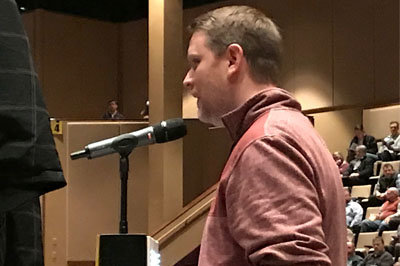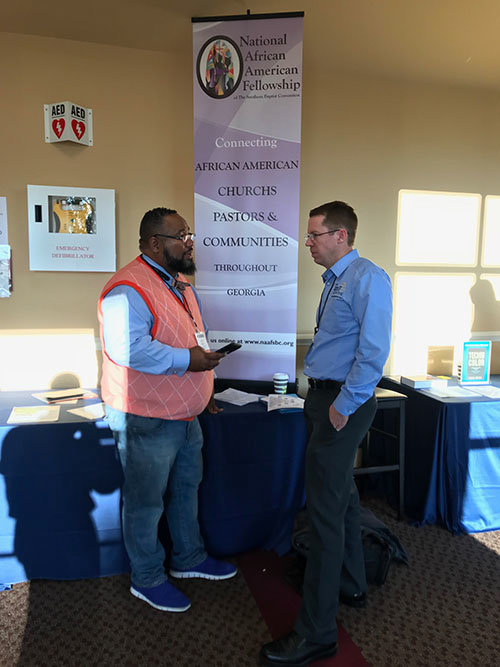Pastor Grady Caldwell reports that 32 new churches and 4 missions affiliated with the Georgia Baptist Convention in 2017. JOE WESTBURY/Index
LAWRENCEVILLE — Messengers to the 196th annual meeting of the Georgia Baptist Convention approved a $41.2-million budget for 2018, up about $175,000 from projected Cooperative Program income for the current year.
The approval came as part of the Executive Committee’s report which included a number of items, including approval of a new line item known as Benchmark Funding which was created to encourage Georgia Baptist educational institutions to excel in four specific areas of improvement, with a bonus for reaching all four incentives.
Georgia Baptist Mission Board Executive Director J. Robert White noted the increase was modest “but is going in the right direction.” The slight increase is in line with previous years of conservative stewardship, which increased the 2016 budget by $200,000 and the current 2017 budget by $400,000.
The straight-line budget is slowly pulling the Mission Board out of the Great Recession and years of deep cuts, such as the $1.4 million that was trimmed from the 2014 budget and which pushed the agency to levels not seen such as 1998.
Georgia Baptist Mission Board Executive Director J. Robert White thanked the churches for their sacrificial giving to the Cooperative Program and the Mission Georgia State Missions Offering.
 Messenger Philip Corbean of Douglas inquires about the Convention not following the 50/50 split in Cooperative Program giving as was outlined in the Great Commission Resurgence Task Force Report. Corbean is a member of Carver Baptist Church. JOE WESTBURY/Index
Messenger Philip Corbean of Douglas inquires about the Convention not following the 50/50 split in Cooperative Program giving as was outlined in the Great Commission Resurgence Task Force Report. Corbean is a member of Carver Baptist Church. JOE WESTBURY/IndexDuring the budget presentation, which he shared with Executive Committee member Randy Wood, White lamented the ongoing decline of Cooperative Program giving and its impact on reaching Georgia – and the world – for Christ. However, White rejoiced that 40 percent of Cooperative Program receipts will be forwarded to Southern Baptist Convention ministries in 2018.
In addition, a total of 13.74 percent – or $5,660,880 – will be allotted for Georgia Baptist ministries. Entities receiving that funding are four colleges and universities, the Ministerial Education Fund, the Education Commission, Baptist Village, Baptist Retirement Communities of Georgia, and the Georgia Baptist Foundation.
The remaining 46.26 percent – $22,127,864 – will fund Georgia Baptist Mission Board ministries beginning in Georgia and extending around the world. Included in that amount is additional non-Cooperative Program income the Board expects to receive of $1,500,000 from the Mission Georgia Offering; $522,000 from Cooperative Agreements; and $1,046,744 from Investment/Registration/and other income.
After the presentation, messenger Philip Corbea, pastor of Carver Baptist Church in Douglas, questioned the rationale for not following the 50/50 funding split recently embraced by other Conventions. He referenced IMB President David Platt’s sermon during the Sunday evening Inspirational Rally, and Platt’s graphic depiction of the horrors of hell that await those who do not hear the Gospel message.
Corbean also referenced the 2010 Great Commission Task Force Report which strongly urged state conventions to move to a 50/50 dispersion of Cooperative Program funds between those that remain in the state and those that are forwarded to the SBC Executive Committee.
 Georgia Representative Wes Cantrell, center, and Senator Marty Harbin, right, were named 2017 Legislators of the Year during this year's Convention meeting. Mike Griffin, left, who serves as Georgia Baptists' primary lobbyist in the State Capitol, stands to the left. JOE WESTBURY/Index
Georgia Representative Wes Cantrell, center, and Senator Marty Harbin, right, were named 2017 Legislators of the Year during this year's Convention meeting. Mike Griffin, left, who serves as Georgia Baptists' primary lobbyist in the State Capitol, stands to the left. JOE WESTBURY/IndexThe funds that are forwarded to SBC headquarters are distributed between national entities and the two mission agencies, one of which is the International Mission Board.
White responded by explaining that the 50/50 division of funds, which was spelled out from the founding of the Cooperative Program in 1925, also specified that churches would follow the same formula and keep 50 percent of their offerings and forward 50 percent to the state convention … which would then forward 50 percent to the SBC Executive Committee.
However, he acknowledged the steady decline of churches giving to the Cooperative Program. While the original suggestion was a tithe of 10 percent, the average amount is now pegged at 5 percent … about a nickel out of every dollar received.
The state executive has stated for years, in encouraging churches to greater heights of Cooperative Program support, that “You can’t reach the world on a nickel” of every dollar given to the church.
White, while highly supportative of reaching the nation and world through the North American and International Mission boards, said the Georgia Baptist Mission Board also had an historic obligation to support its own ministries to reach the state for Christ.
“If we didn’t have our own institutions I would be in favor of sending 52 percent or even 54 percent out of state” but added that he did not see the wisdom in defunding those entities.
 Jean Ward, president of the Georgia Baptist African American Fellowship, visits with messenger Jason Lee at the group's booth. JOE WESTBURY/Index
Jean Ward, president of the Georgia Baptist African American Fellowship, visits with messenger Jason Lee at the group's booth. JOE WESTBURY/IndexHe maintained the value of those institutions as grassroots priorities to reaching the world with the gospel. For example, he stated that Georgia Baptist colleges and universities “provide the missionaries for the field. We are a missionary supporting and sending Convention” and Georgia is part of the pipeline that educates missionaries who are called to the North American as well as international fields.
John Waters, pastor of First Baptist Church of Statesboro, was then recognized and said he wanted to clarify a common misperception that the agency continues to struggle with reduced number of missionaries on the field due to recent drastic cutbacks.
He noted that IMB President David Platt recently reported that the agency is now operating in the black with a balanced budget and is back on track with missionary appointments.
He added that Southern Baptists can be assured that the agency is operating at greater efficiency than in past years and is being a proper steward of the gifts which it receives from churches and state conventions.
Following the discussion, messengers voted to approve the budget as presented.
Messengers also approved, as part of the overall budget, a new line item known as Benchmark Funding, which was created to encourage its educational institutions to excel in four specific areas of improvement, with a bonus for reaching all four incentives. Those incentives, each valued at $60,000, will introduce friendly competition for annual awards based on:
A bonus $60,000 award, known as the Grand Slam, will be awarded to the college or university that achieves all four incentive awards in the same year. The institution reaching the four incentives and the Grand Slam will receive $300,000 for that year.
The new funding was created following the adoption of a Task Force Report on the Mission Board’s education institutions.
In other business, messengers recognized two legislators “for their leadership and commitment to Godly principles” as they represent their constituents at the State Capitol. Receiving plaques were Representatiave Wes Cantrell and Senator Marty Harbin. GBC Public Affairs Representative Mike Griffin participated in the ceremony.
Grady Caldwell, pastor of New Mercy Baptist Church in Newnan, presented the annual report detailing the number of churches which have affiliated with the Georgia Baptist Convention. A total of 32 new churches and 4 missions are now part of the Georgia Baptist family.
Click here or on the graph below for an easy-to-understand overview of the history of the 50/50 distribution and the erosion of Cooperative Program giving.